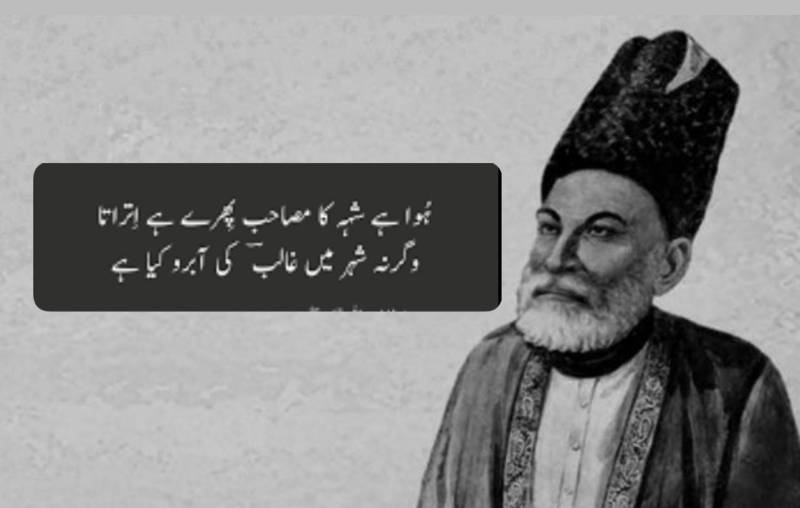Lahore (Web Desk): The 156th death anniversary of Mirza Asadullah Khan Ghalib, the great Urdu poet of sub-continent and one of the most revered figures in the history of literature, is being observed today (Saturday).
Born on December 27, 1797, in Akbarabad, now known as Agra, Ghalib’s poetic genius has left an indelible mark on the subcontinent.
His mastery in both Urdu and Persian poetry has made him an icon whose works are celebrated and interpreted in myriad ways.
Known for his profound ghazals, Ghalib's poetic expression captured the nuances of human emotions—love, despair, longing, and the complexities of life itself.
Beginning his journey in verse at the tender age of 10 or 12, Ghalib had already composed some of his most iconic ghazals by the time he was 19.
His works, brimming with subtle metaphors and poignant reflections, resonated deeply with readers and listeners, securing his place among the greatest poets of the region.
Spending much of his life in the cultural heart of Delhi, he witnessed firsthand the decline of the Mughal Empire and wrote incisively about the political and social changes shaping his world.
His poetry, thus, not only expressed personal sentiments but also commented on the shifting tides of history.
Through his celebrated works such as Diwan-i-Ghalib, Kulyat, and Maktoobat, he presented his unique vision of the world.
Ghalib’s words continue to echo in the corridors of time, bringing fresh insights into the depths of human experience.
His ghazals, both in Persian and Urdu, remain a beacon for generations of poets and poetry lovers alike.
The honorific titles bestowed upon him, Dabir-ul-Mulk and Najm-ud-Daula, were a testament to his stature in the Mughal court, though his poetry was often more deeply connected to the pulse of the common people than the imperial court.
Ghalib lived in the heart of Old Delhi, in Gali Qasim Jaan, Ballimaran, Chandni Chowk, a place now known as Ghalib Ki Haveli. This residence, once a hub of literary and cultural exchange, has since been transformed into a memorial to honor the poet’s memory.
The permanent exhibition housed there continues to celebrate his life and work, drawing admirers from all over the world.
On February 15, 1869, Ghalib passed away, leaving behind a legacy that transcends time.
His tomb, located near Chausath Khamba in Nizamuddin, Delhi, remains a site of pilgrimage for those who seek to pay homage to the poet whose words still captivate hearts across borders, in India, Pakistan, and beyond.
Though Ghalib is no longer with us, his poetry endures, a constant companion to those who seek wisdom, solace, and beauty in the written word.
His verses, as relevant today as they were in his time, continue to stir the souls of countless admirers around the world.


